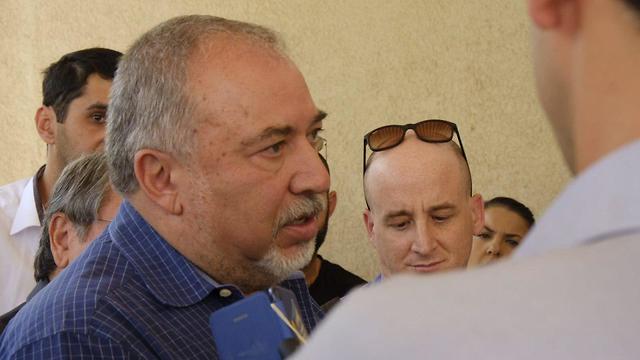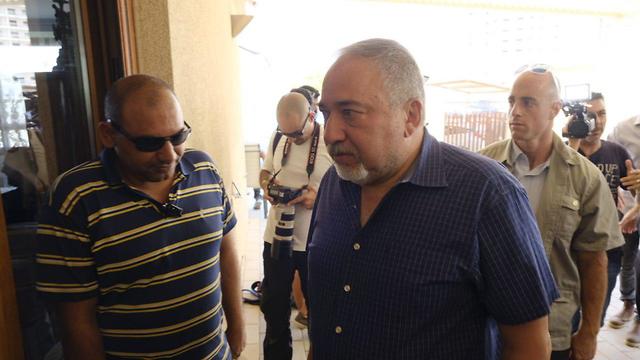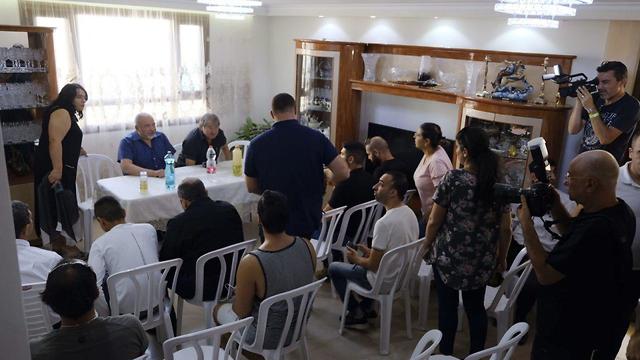

Lieberman: Hamas forcing us into 'wide scale and painful operation'
During meeting with Gaza border residents, defense minister insists Israel has shown restraint and has conducted itself responsibly in face of ongoing fire terrorism, but cautions that without an intensified response, Israel's deterrence capabilities hang in the balance; 'The situation is intolerable. We cannot accept it.'
“We are making efforts to weigh matters and be responsible, but the heads of Hamas are forcefully leading us to a situation in which we have no choice, to a situation in which we will have to embark on a wide scale and painful military operation that is not intended for show—a wide scale and painful military operation,” he emphatically repeated.
Lieberman’s comments come against a backdrop of American efforts to kick-start international aid initiatives to alleviate the economic paralysis gripping the Gaza Strip on condition that Hamas renounce terror.
“Any reasonable person who sees the burned natural woodland which is thousands of dunams of agricultural farms that are burned understands that the situation is intolerable," he said during a meeting with Gaza border residents.
"We really are conducting ourselves responsibly and with restraint, even though the real problem with that is the erosion of deterrence, a change in the equation and, of course, the feeling of security which is no less important than security itself and having to come to terms with a reality in which at the end of last week the residents in the Gaza region were forced to run 20 times to bomb shelters," Lieberman explained.
He also decried the reality of southern residents "preparing their safe rooms as an integral part of their Shabbat. We cannot accept this kind of situation."
The blame, he said, lies purely with Hamas’s leadership, “but unfortunately, the resident of Gaza will also have to pay the price. Therefore, I call on the residents of Gaza first of all to put pressure on Hamas to change direction, to change the equation. It is possible to return to a civil and reasonable reality and for easing economic (hardships—ed) in exchange for a complete cessation of terror and provocations on the border fence.”
Reiterating that the situation was “intolerable”, Lieberman emphasized that Israel was “genuinely making efforts to show restraint” and to show responsibility. However, he added that the issue was no longer restricted to concerns of incinerated landscape, but also maintaining Israel’s deterrence capabilities.
“This is obviously the most important thing … There should be no misunderstanding or illusions,” he said about involvement of Hamas’s higher echelons in organizing the launching of incendiary balloons and kites.
“It’s not something spontaneous, it’s not children, it’s not a wave, it’s the heads of Hamas who are leading the fires and kites and all the friction on the border,” he said.
During his meeting, Lieberman was asked to share his thoughts on the criticism voiced by the local residents about the conduct of the cabinet in light of leaked disputes that between Education Minister Naftali Bennett and IDF Chief of Staff Gadi Eisenkot, and about opposition to the army’s handling of the fire terrorism.
“I don’t know which residents you are talking about. I speak every day with the residents, with authority leaders and I haven’t heard a single word of criticism against the army. The is criticism against the political echelons and that is fine and even welcomed,” he responded.
“Responsibility also demands restoring a normal situation, not a reality in which a person here prepares for Shabbat he first of all prepares his safe room. It’s unnatural and it’s abnormal,” Lieberman continued.
The defense minister rebuffed the implication that the government had made an error in “accepting” the fire terror when it first began.
“I think that we acted in the most correct manner from the start and we are still acting in the best way. I want to remind you all that since the March of the Million when they called for provocations at the fence, there are 159 terrorists who are dead and close to 5,000 wounded. We have struck essential Hamas infrastructure … and two tunnels,” he said.
With the IDF’s destruction of the two tunnels, he pointed out, Israel have frustrated between three and four years of time and investment.
“Hamas, by the way, is not sensitive to human life. On the contrary, every dead person is a shahid, a propaganda tool against Israel. It sensitivity lies in the weapons manufacturing sites, in the tunnels and we are hitting those first,” he stated.
At the end of last week, he continued, Israel fired 50 tons of ammunition at strategic assets belonging to Hamas, a factor which he said sent a clear message. “If it wasn't understood, we’ll have to continue,” he warned.
No one in the room, he said was seeking “adventures”, but while the defense minister once again repeated the message of restraint, he vowed that if a full-throttled military offensive was required, “we will launch one a lot bigger and a lot more painful than Protective Edge.”
Lieberman also flatly denied any talks were currently taking place between Israel and Hamas, insisting that Jerusalem is “in close contact with the relevant people, “whether that is the Egyptians or the UN representative.”
The latest round of violence took place between Israel and the Gaza Strip when Israeli jets attacked on Thursday afternoon a terror squad launching incendiary balloons next to a Hamas military post in the southern Gaza Strip, killing one Hamas terrorist and wounding three others.
Shortly after the Israeli jets attacked, two mortar shells were fired at IDF an force from southern Gaza near the border fence. No casualties were reported.
It was soon followed with four Code Red rocket alert sirens in the Eshkol Regional Council. Two mortar shells landed near a cowshed in Eshkol. The IDF responded with tank fire at a Hamas observation post.


















